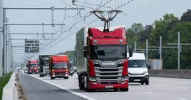Nicholas Lewis
Established Member
Department of Transport has made a written statement on this but supporting documents and specifically the Rail Environment Policy Statement not yet posted on the DofT website.
Thi document will look at
Which will presumably respond to where they see electrification as an enabler
Thi document will look at
The government is also publishing its rail environment policy statement, which will set the direction for the rail industry on environment issues and inform the forthcoming sustainable rail strategy. The document will look at traction decarbonisation, air quality, decarbonising the rail estate and a range of other environmental-related issues on the railway, including biodiversity and waste.
Which will presumably respond to where they see electrification as an enabler

